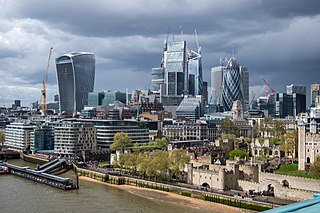
Universities in the United Kingdom have generally been instituted by royal charter, papal bull, Act of Parliament, or an instrument of government under the Further and Higher Education Act 1992 or the Higher Education and Research Act 2017. Degree awarding powers and the 'university' title are protected by law, although the precise arrangements for gaining these vary between the constituent countries of the United Kingdom.
Further education in the United Kingdom and Ireland is additional education to that received at secondary school that is distinct from the higher education (HE) offered in universities and other academic institutions. It may be at any level in compulsory secondary education, from entry to higher level qualifications such as awards, certificates, diplomas and other vocational, competency-based qualifications through awarding organisations including City and Guilds, Edexcel (BTEC) and OCR. FE colleges may also offer HE qualifications such as HNC, HND, foundation degree or PGCE. The colleges are also a large service provider for apprenticeships where most of the training takes place at the apprentices' workplace, supplemented with day release into college.

Education in England is overseen by the Department for Education. Local government authorities are responsible for implementing policy for public education and state-funded schools at a local level. State-funded schools may be selective grammar schools or non-selective comprehensive schools. All state schools are subject to assessment and inspection by the government department Ofsted. England also has private schools and home education; legally, parents may choose to educate their children by any suitable means.
In the United Kingdom (UK), a post-1992 university, synonymous with new university or modern university, is a former polytechnic or central institution that was given university status through the Further and Higher Education Act 1992, or an institution that has been granted university status since 1992 without receiving a royal charter. This is used in contrast to "pre-1992" universities.
Education in Scotland is provided in state schools, private schools and by individuals through homeschooling. Mandatory education in Scotland begins for children in Primary 1 (P1) at primary school and ends in Fourth Year (S4) at secondary school. Overall accountability and control of state–education in Scotland rests with the Scottish Government, and is overseen by its executive agency, Education Scotland, with additional responsibility for nursery schools being the joint responsibility of both Education Scotland and the Care Inspectorate. Scotland's private schools are overseen by the Scottish Council of Independent Schools. Children in Scotland sit mandatory National Standardised Assessments in Primary 1 (P1), Primary 4 (P4), Primary 7 (P7) at the end of primary school, and Third Year (S3) in secondary school, which assist in monitoring children's progress and providing diagnostic data information to support teachers' professional judgement.
The education system in Northern Ireland differs from elsewhere in the United Kingdom, but is similar to the Republic of Ireland in sharing in the development of the national school system and serving a similar society with a relatively rural population. A child's age on 1 July determines the point of entry into the relevant stage of education in the region, whereas the relevant date in England and Wales is 1 September.
The Higher Education Funding Council for England (HEFCE) was a non-departmental public body in the United Kingdom, which was responsible for the distribution of funding for higher education to universities and further education colleges in England since 1992. It ceased to exist as of 1 April 2018, when its duties were divided between the newly created Office for Students and Research England.

The Quality Assurance Agency for Higher Education is the United Kingdom higher education sector's independent expert quality body. It has a remit to maintain and enhance the quality of teaching and learning in tertiary education in the United Kingdom and beyond. It conducts quality assessment reviews, develops reference points and guidance for providers, and conducts or commissions research on relevant issues.

A sixth form college is an educational institution, where students aged 16 to 19 study typically for advanced post-school level qualifications such as A Levels, Business and Technology Education Council level 3 (BTEC), and the International Baccalaureate Diploma, or school-level qualifications such as General Certificate of Secondary Education (GCSE) examinations and BTEC level 2 qualifications. In many countries this type of educational institute is known as a junior college. The municipal government of the city of Paris uses the phrase 'sixth form college' as the English name for a lycée.

The Scottish Funding Council, formally the Scottish Further and Higher Education Funding Council, is the non-departmental public body charged with funding Scotland's further and higher education institutions, including its 26 colleges and 19 universities.
Sir Gareth Gwyn Roberts was a Welsh physicist specialising in semiconductors and molecular electronics, who was influential in British science policy through his chairmanship of several academic bodies and his two reports on the future supply of scientists and how university research should be assessed. He was knighted in 1997 for his services to higher education.

Research Councils UK, sometimes known as RCUK, was a non-departmental public body that coordinated science policy in the United Kingdom from 2002 to 2018. It was an umbrella organisation that coordinated the seven separate research councils that were responsible for funding and coordinating academic research for the arts, humanities, science and engineering. In 2018 Research Councils transitioned into UK Research and Innovation (UKRI).
A polytechnic was a tertiary education teaching institution in England, Wales and Northern Ireland offering higher diplomas, undergraduate degree and postgraduate education that was governed and administered at the national level by the Council for National Academic Awards. At the outset, the focus of polytechnics was on STEM subjects, with a special emphasis on engineering. After the passage of the Further and Higher Education Act 1992 they became independent universities, which meant they could award their own degrees. The comparable institutions in Scotland were collectively referred to as Central Institutions.

The regions of England, formerly known as the government office regions, are the highest tier of sub-national division in England. They were established in 1994 and follow the 1974–96 county borders. They are a continuation of the former 1940s standard regions which followed the 1889–1974 administrative county borders. Between 1994 and 2011, all nine regions had partly devolved functions; they no longer fulfil this role, continuing to be used for limited statistical purposes.

The Department for Education (DfE) is a ministerial department of the Government of the United Kingdom. It is responsible for child protection, child services, education, apprenticeships, and wider skills in England.

Specialist schools in the United Kingdom are schools with an emphasis or focus in a specific specialised subject area, which is called a specialism, or alternatively in the case of some special schools in England, in a specific area of special educational need. They intend to act as centres of excellence in their specialism and, in some circumstances, may select pupils for their aptitude in it. Though they focus on their specialism, specialist schools still teach the full curriculum. Therefore, as opposed to being a significant move away from it, the specialism is viewed as enriching the original curricular offer of the school.

Greater London is the administrative area of London, England, which is coterminous with the London region. It contains 33 local government districts: the 32 London boroughs, which form a ceremonial county also called Greater London, and the City of London. The Greater London Authority is responsible for strategic local government across the region, and regular local government is the responsibility of the borough councils and the City of London Corporation. Greater London is bordered by the ceremonial counties of Hertfordshire to the north, Essex to the north-east, Kent to the south-east, Surrey to the south, and Berkshire and Buckinghamshire to the west.

Welsh devolution is the transfer of legislative power for self-governance to Wales by the Government of the United Kingdom.











